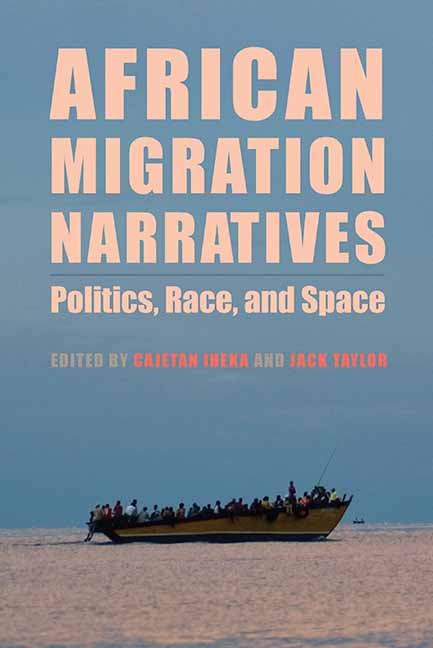Book contents
- Frontmatter
- Contents
- Acknowledgments
- Introduction: The Migration Turn in African Cultural Productions
- Part One African Migration on the Screen: Films of Migration
- Part Two Forgotten Diasporas: Lusophone and Indian Diasporas
- Part Three Migration against the Grain: Narratives of Return
- 8 Reading Space, Subjectivity, and Form in the Twenty-First-Century Narrative of Return
- 9 Looking for Transwonderland: Noo Saro-Wiwa's Migration of the Heart
- 10 The Literary Circulation of Teju Cole's Every Day Is for the Thief
- 11 Speculative Migration and the Project of Futurity in Sylvestre Amoussou's Africa Paradis
- Part Four Migration and Difference: Indigeneity, Race, Religion, and Poetry at the Margins
- Bibliography
- Notes on Contributors
- Index
9 - Looking for Transwonderland: Noo Saro-Wiwa's Migration of the Heart
from Part Three - Migration against the Grain: Narratives of Return
Published online by Cambridge University Press: 26 July 2019
- Frontmatter
- Contents
- Acknowledgments
- Introduction: The Migration Turn in African Cultural Productions
- Part One African Migration on the Screen: Films of Migration
- Part Two Forgotten Diasporas: Lusophone and Indian Diasporas
- Part Three Migration against the Grain: Narratives of Return
- 8 Reading Space, Subjectivity, and Form in the Twenty-First-Century Narrative of Return
- 9 Looking for Transwonderland: Noo Saro-Wiwa's Migration of the Heart
- 10 The Literary Circulation of Teju Cole's Every Day Is for the Thief
- 11 Speculative Migration and the Project of Futurity in Sylvestre Amoussou's Africa Paradis
- Part Four Migration and Difference: Indigeneity, Race, Religion, and Poetry at the Margins
- Bibliography
- Notes on Contributors
- Index
Summary
In recent years several scholars and writers have explored the complexities of migration and return to one's homeland. However, the knottiness of the diasporic person's return to his or her land of birth under the shadow of trauma that is both personal and political in nature remains largely unexplored. Noo Saro-Wiwa, in her memoir/travel narrative Looking for Transwonderland: Travels in Nigeria, excavates this challenging terrain. This chapter discusses how, for some members of the African diaspora, the oft-quoted phrase “the personal is political” gets played out in very real ways when they return to their land of birth, even if for a short while, especially when the returnee has a history of trauma with regard to the native land.
When I use the term African diaspora, I do not do so in the way that it is largely understood as someone who is a descendant of African people who were forcibly shipped to the New World and subjected to the European institution of slavery from the sixteenth to the nineteenth century. Rather, I use it in the way Noo does—as a first-generation African who has migrated to another country. This widely neglected segment of the African diaspora holds its own set of complicated and tension-ridden relationships with the “homeland,” a relationship that is further complicated by one's status as an ethnic minority.
Trauma, Loss, Absence
In Writing History, Writing Trauma, the historian Dominick LaCapra posits that “a crucial issue with respect to traumatic historical events is whether attempts to work through problems, including rituals of mourning, can viably come to terms with (without ever fully healing or overcoming) the divided legacies, open wounds, and unspeakable losses of a dire past.” He distinguishes the trauma of loss from absence and warns against mistaking one for the other. Nonetheless, he suggests that blurring the distinction between, or conflating them is, in fact, telling and useful to understanding trauma as it “may itself bear striking witness to the impact of trauma and the post-traumatic, which create a state of disorientation, agitation, or even confusion and may induce a gripping response whose power and force of attraction can be compelling.” He concludes that “the very conflation attests to the way one remains possessed or haunted by the past, whose ghosts and shrouds resist distinctions (such as that between absence and loss).”
- Type
- Chapter
- Information
- African Migration NarrativesPolitics, Race, and Space, pp. 160 - 172Publisher: Boydell & BrewerPrint publication year: 2018



